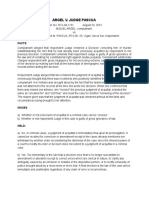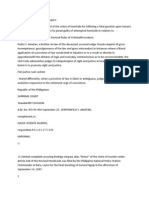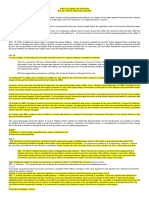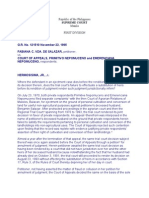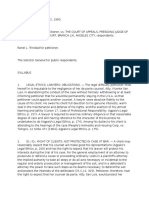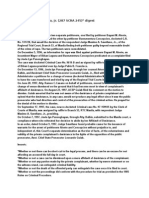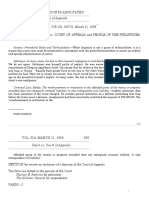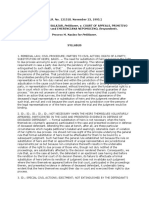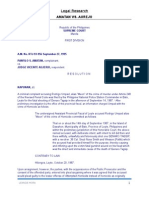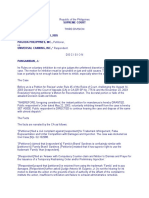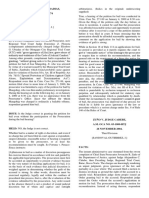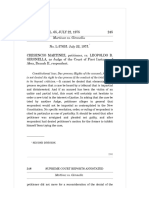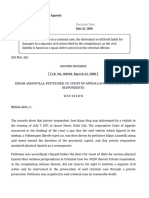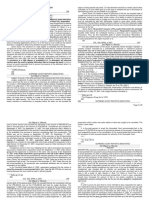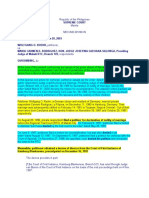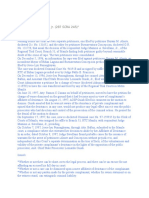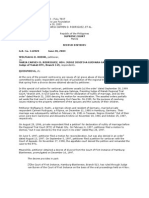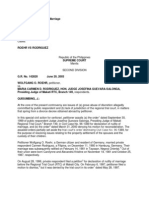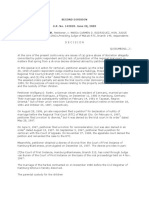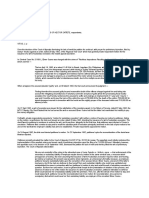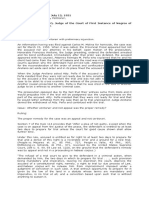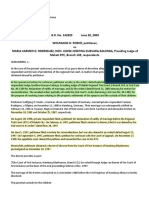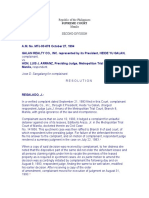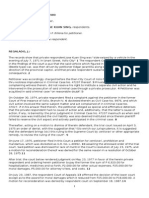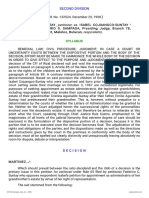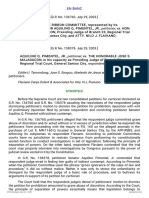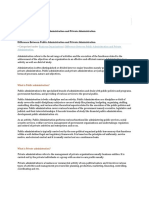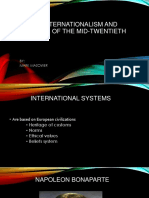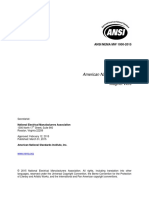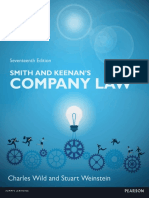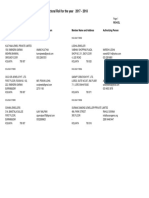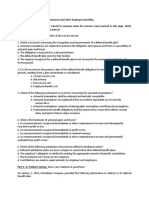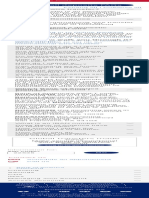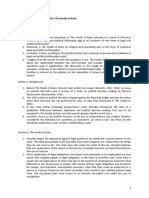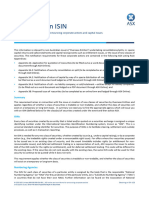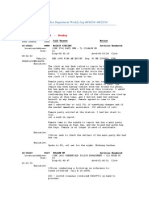Complainant Vs Vs Respondent: Second Division
Complainant Vs Vs Respondent: Second Division
Uploaded by
keeshia hernanCopyright:
Available Formats
Complainant Vs Vs Respondent: Second Division
Complainant Vs Vs Respondent: Second Division
Uploaded by
keeshia hernanOriginal Description:
Original Title
Copyright
Available Formats
Share this document
Did you find this document useful?
Is this content inappropriate?
Copyright:
Available Formats
Complainant Vs Vs Respondent: Second Division
Complainant Vs Vs Respondent: Second Division
Uploaded by
keeshia hernanCopyright:
Available Formats
SECOND DIVISION
[A.M. No. RTJ-94-1131. August 20, 2001.]
MIGUEL ARGEL , complainant, vs . JUDGE HERMINIA M. PASCUA, RTC-
Br. 25, Vigan, Ilocos Sur , respondent.
SYNOPSIS
Complainant was acquitted by respondent judge from the crime of murder in a
decision dated July 22, 1993. On August 19, 1993; however, respondent reversed the
decision and convicted complainant. Respondent explained that she initially acquitted
complainant on the ground that there was no witness who positively identi ed
complainant as the perpetrator of the crime. But upon con rming that there was such
witness, respondent reversed her earlier decision and convicted complainant.
Respondent judge was found guilty of gross ignorance of the law. In criminal cases,
a judgment of acquittal is immediately final upon its promulgation. It cannot be recalled for
correction or amendment unless for exceptional reasons, nor withdrawn by another order
reconsidering the dismissal of the case. The inherent power of a court to modify its order
or decision does not extend to a Judgment of acquittal in a criminal case.
SYLLABUS
1. REMEDIAL LAW; CIVIL PROCEDURE; JUDGMENT; FINAL DECISION, ELUCIDATED.
— Too elementary is the rule that a decision once nal is no longer susceptible to
amendment or alteration except to correct errors which are clerical in nature, to clarify any
ambiguity caused by an omission or mistake in the dispositive portion, or to rectify a
travesty of justice brought about by a moro-moro or mock trial. A nal decision is the law
of the case and is immutable and unalterable regardless of any claim of error or
incorrectness.
2. ID.; CRIMINAL PROCEDURE; JUDGMENT OF ACQUITTAL; ELUCIDATED. — In
criminal cases, a judgment of acquittal is immediately nal upon its promulgation. It
cannot be recalled for correction or amendment except in the cases already mentioned nor
withdrawn by another order reconsidering the dismissal of the case since the inherent
power of a court to modify its order or decision does not extend to a judgment of acquittal
in a criminal case.
3. ADMINISTRATIVE LAW; JUDGES GROSS IGNORANCE OF THE LAW; PRESENT
WHEN JUDGE REVERSED PROMULGATED JUDGMENT OF ACQUITTAL. — Complainant
herein was already acquitted of murder by respondent in a decision promulgated on 13
August 1993. The decision became nal and immutable on the same day. As a member of
the bench who is always admonished to be conversant with the latest legal and judicial
developments, more so of elementary rules, respondent should have known that she could
no longer "revise" her decision of acquittal without violating not only an elementary rule of
procedure but also the constitutional proscription against double jeopardy. When the law
is so elementary, not to know it constitutes gross ignorance of the law. The fact that
respondent never had any intention of having complainant incarcerated on the basis of the
second decision but only to make him answer for the civil liabilities arising from the crime,
CD Technologies Asia, Inc. 2018 cdasiaonline.com
as respondent explained, cannot exculpate her from administrative liability. On the
contrary, such thinking on the part of respondent that she could still "revise" a promulgated
decision of acquittal even for such a purpose underscores, not mitigates, her gross
ignorance.
4. ID.; ID.; PREPARATION OF DECISION; JUDGES ADMONISHED TO TAKE NOTES. —
We cannot write finis to this case without also commenting on respondent's negligence in
the preparation of her decision. Judges have always been reminded to take down their
own notes of salient portions of hearings and not to rely on the transcripts of stenographic
notes. The pivotal testimony of Tito Retreta would not have been overlooked and
consequently disregarded had respondent prepared her own notes and read them as she
was supposed to.
RESOLUTION
BELLOSILLO , J : p
A.M. No. RTJ-94-1131 ( Miguel Argel v. Judge Herminia M. Pascua, RTC-Br. 25 , Vigan
Ilocos Sur). — This is an administrative complaint for Gross Ignorance of the Law led by
Miguel Argel against Judge Herminia M. Pascua, RTC-Br. 25, Vigan, Ilocos Sur. 1
Complainant alleged in his complaint that respondent Judge rendered a Decision
dated 19 August 1993 2 in Crim. Case No. 2999-V entitled People v. Miguel Argel
convicting him of murder notwithstanding the fact that he had already been previously
acquitted by respondent in her Decision 3 dated 22 July 1993, promulgated on 13 August
1993. Complainant contends that respondent Judge is guilty of gross ignorance of the law
and of violating his constitutional right against double jeopardy.AEDISC
In a letter-explanation dated 7 March 1994 respondent Judge alleged that she
rendered the judgment of acquittal dated 22 July 1993 because she erroneously thought
that there was no witness who positively identi ed the accused, herein complainant, as the
perpetrator of the crime. Her mistake was brought about by the fact that the testimony of
the eyewitness was not attached to the records at the time she wrote her decision.
However, when she re-read her notes after her attention was called by the lawyer of the
private complainant that there was such an eyewitness, respondent con rmed that there
was indeed one in the person of Tito Retreta. Hence she "revised" her previous decision
and rendered the Decision dated 19 August 1993 nding the accused guilty of murder.
Fully aware of her prior decision of acquittal, respondent nevertheless ordered the police
to bring complainant Argel to court not for the purpose of having him incarcerated but only
to inform him of her new decision so that he could be made to answer for his civil liabilities
arising from the crime. Before she could explain the matter to complainant, the latter's
brother already led a petition for habeas corpus before the Court of Appeals. 4 According
to respondent, she decided to await the hearing of the petition before setting complainant
free so that she could give him a copy of her new decision. 5
In his Reply to the letter-explanation of respondent, complainant additionally
charged respondent with gross negligence for not exercising extreme caution in the
preparation of her decision by making sure that all the transcripts of stenographic notes
were attached to the records before writing the decision. 6
CD Technologies Asia, Inc. 2018 cdasiaonline.com
In a Memorandum dated 11 May 2001 the O ce of the Court Administrator
recommended that respondent be fined P20,000.00 for gross ignorance of the law.
As stated earlier, complainant was accused of murder in Crim. Case No. 2999-V of
the RTC of Vigan, Ilocos Sur. On 13 August 1993 judgment was promulgated acquitting
him on the ground that there was no witness who positively identi ed him as the
perpetrator of the crime. However after respondent's attention was called by the private
complainant's counsel to the fact that there was such a witness and con rmed by
respondent upon re-reading her notes, she issued an Order dated 16 August 1993 stating
her intention to "revise" the previous judgment of acquittal, branded the same as "uncalled
for" and "not nal," and reset the case for another "rendering of the decision." 7 The reason
given was that the judgment of acquittal was rendered without all the facts and
circumstances being brought to her attention.
Respondent Judge explained that the transcript of stenographic notes of the
testimony of eyewitness Tito Retreta was not attached to the records when she wrote her
decision. Thus, in a Decision dated 19 August 1993, respondent Judge declared herein
complainant Miguel Argel guilty beyond reasonable doubt of murder on the basis of the
eyewitness account of Tito Retreta, sentenced complainant Argel to seventeen (17) years,
four (4) months and one (1) day of reclusion temporal to reclusion perpetua, and to pay
the heirs of the victim P50,000.00 as civil indemnity and P60,000.00 for actual damages.
Too elementary is the rule that a decision once nal is no longer susceptible to
amendment or alteration except to correct errors which are clerical in nature, 8 to clarify
any ambiguity caused by an omission or mistake in the dispositive portion, 9 or to rectify a
travesty of justice brought about by a moro-moro or mock trial. 1 0 A nal decision is the
law of the case and is immutable and unalterable regardless of any claim of error or
incorrectness. 1 1
In criminal cases, a judgment of acquittal is immediately nal upon its promulgation.
12 It cannot be recalled for correction or amendment 1 3 except in the cases already
mentioned nor withdrawn by another order reconsidering the dismissal of the case since
the inherent power of a court to modify its order or decision does not extend to a
judgment of acquittal in a criminal case. 1 4C HIaTc
Complainant herein was already acquitted of murder by respondent in a decision
promulgated on 13 August 1993. Applying the aforestated rule, the decision became nal
and immutable on the same day. As a member of the bench who is always admonished to
be conversant with the latest legal and judicial developments, more so of elementary rules,
respondent should have known that she could no longer "revise" her decision of acquittal
without violating not only an elementary rule of procedure but also the constitutional
proscription against double jeopardy. When the law is so elementary, not to know it
constitutes gross ignorance of the law. 1 5
The fact that respondent never had any intention of having complainant incarcerated
on the basis of the second decision but only to make him answer for the civil liabilities
arising from the crime, as respondent explained, cannot exculpate her from administrative
liability. On the contrary, such thinking on the part of respondent that she could still "revise"
a promulgated decision of acquittal even for such a purpose underscores, not mitigates,
her gross ignorance.
We cannot write nis to this case without also commenting on respondent's
negligence in the preparation of her decision. Judges have always been reminded to take
CD Technologies Asia, Inc. 2018 cdasiaonline.com
down their own notes of salient portions of hearings and not to rely on the transcripts of
stenographic notes. The pivotal testimony of Tito Retreta would not have been overlooked
and consequently disregarded had respondent prepared her own notes and read them as
she was supposed to.
WHEREFORE, for Gross Ignorance of the Law respondent Judge Herminia M.
Pascua, RTC-Br. 25, Vigan, Ilocos Sur, is FINED P20,000.00, the same to be deducted from
her retirement bene ts. Since respondent has already compulsorily retired as of 18
September 1998, let her retirement bene ts be immediately released to her minus the
amount of P20,000.00 herein imposed on her as fine.
SO ORDERED.
Mendoza, Quisumbing, Buena and De Leon, Jr., JJ., concur.
Footnotes
1. Respondent Judge compulsorily retired on 18 September 1998.
2. Rollo, pp. 12-20.
3. Id., pp. 4-9.
4. Docketed as CA-G.R. SP No. 32060. Complainant was eventually ordered released in an Order
dated 4 October 1993 of Executive Judge Efren O. Ramos, RTC, Vigan, Ilocos Sur, who
heard and decided the petition per Resolution dated 20 September 1993 of the Court of
Appeals.
5. Rollo, pp. 50-51.
6. Id., p. 54-55
7. Id., pp. 10-11.
8. Yu v. National Labor Relations Commission, G.R. Nos. 111810-11, 16 June 1995, 245 SCRA
134.
9. Hiyas Savings and Loan Bank v. Court of Appeals, G.R. No. 95625, 4 October 1991, 202
SCRA 543.
10. Galman v. Sandiganbayan, G.R. No. 72670, 12 September 1986, 144 SCRA 43.
11. Buaya v. Stronghold Insurance Co., Inc., G.R. No. 139020, 11 October 2000.
12. Regalado, Florenz, Remedial Law Compendium, Vol. II, Seventh Rev. Ed., p. 453 citing
People v. Sison, 105 Phil. 1249 (1959).
13. People v. Sison, 105 Phil 1249 (1959).
14. Catilo v. Abaya, 94 Phil. 1014 (1954).
15. Cortes v. Agcaoili, A.M. No. RTJ-98-1414, 20 August 1998, 294 SCRA 423.
CD Technologies Asia, Inc. 2018 cdasiaonline.com
You might also like
- The Book of Writs - With Sample Writs of Quo Warranto, Habeas Corpus, Mandamus, Certiorari, and ProhibitionFrom EverandThe Book of Writs - With Sample Writs of Quo Warranto, Habeas Corpus, Mandamus, Certiorari, and ProhibitionRating: 5 out of 5 stars5/5 (10)
- Sample Motion to Vacate, Motion to Dismiss, Affidavits, Notice of Objection, and Notice of Intent to File ClaimFrom EverandSample Motion to Vacate, Motion to Dismiss, Affidavits, Notice of Objection, and Notice of Intent to File ClaimRating: 5 out of 5 stars5/5 (23)
- Manantan Vs CADocument6 pagesManantan Vs CAJom Eugene JambonganaNo ratings yet
- Guillermo vs. Reyes (Case Digest) 240 Scra 154Document2 pagesGuillermo vs. Reyes (Case Digest) 240 Scra 154Anonymous qRfOOBcYEJNo ratings yet
- Judges QualificationDocument2 pagesJudges QualificationmehNo ratings yet
- 104 - Fulltext - Argel Vs Pascua - AM No. RTJ-94-1131Document3 pages104 - Fulltext - Argel Vs Pascua - AM No. RTJ-94-1131Wed CornelNo ratings yet
- Argel v. Judge Pascua - Case DigestDocument2 pagesArgel v. Judge Pascua - Case DigestRoxanne Peña100% (1)
- Crimpro DigestDocument20 pagesCrimpro DigestaybiijoyceNo ratings yet
- 248 SCRA 511 Amatan Vs AujeroDocument8 pages248 SCRA 511 Amatan Vs Aujerobrecht19800% (1)
- 248 SCRA 511 Amatan Vs AujeroDocument3 pages248 SCRA 511 Amatan Vs AujeroJun RinonNo ratings yet
- 2-Almario vs. Court of Appeals, 355 SCRADocument10 pages2-Almario vs. Court of Appeals, 355 SCRAChuck GalvadoresNo ratings yet
- Pacoy Vs Cajigal - G.R. No. 157472 - Case DigestDocument2 pagesPacoy Vs Cajigal - G.R. No. 157472 - Case DigestAbigail Tolabing40% (5)
- 3 Concerned Citizens v. Judge ElmaDocument3 pages3 Concerned Citizens v. Judge ElmaryanmeinNo ratings yet
- Supreme CourtDocument22 pagesSupreme CourtMikko AcubaNo ratings yet
- G.R. No. 121510 November 23, 1995 FABIANA C. VDA. DE SALAZAR, Petitioner, Court of Appeals, Primitivo Nepomuceno and Emerenciana NEPOMUCENO, RespondentsDocument5 pagesG.R. No. 121510 November 23, 1995 FABIANA C. VDA. DE SALAZAR, Petitioner, Court of Appeals, Primitivo Nepomuceno and Emerenciana NEPOMUCENO, RespondentsNanz JermaeNo ratings yet
- Amatan Vs AujeroDocument4 pagesAmatan Vs AujeroMer MangueraNo ratings yet
- Suarez Vs CADocument7 pagesSuarez Vs CAJan Jason Guerrero LumanagNo ratings yet
- Alonte Vs SavellanoDocument17 pagesAlonte Vs SavellanoOlek Dela Cruz100% (1)
- Sajot vs. Court of Appeals, 304 SCRA 534, G.R. No. 109721 March 11, 1999Document5 pagesSajot vs. Court of Appeals, 304 SCRA 534, G.R. No. 109721 March 11, 1999CherNo ratings yet
- Concerned Citizens v. Judge ElmaDocument5 pagesConcerned Citizens v. Judge ElmaAndotNo ratings yet
- Complainant Vs Vs Respondents Diosdado C. Sebrio, Jr. Amancio C. Balicud Napoleon Uy Galit and Associates Law OfficesDocument19 pagesComplainant Vs Vs Respondents Diosdado C. Sebrio, Jr. Amancio C. Balicud Napoleon Uy Galit and Associates Law OfficesRon Russell Solivio MagbalonNo ratings yet
- Probation - Decided CasesDocument31 pagesProbation - Decided Casesalbert limNo ratings yet
- Vda. de Salazar vs. CADocument5 pagesVda. de Salazar vs. CAAndrei Jose V. LayeseNo ratings yet
- Limpot v. CA, L-44642 (February 20, 1989)Document6 pagesLimpot v. CA, L-44642 (February 20, 1989)John simon jrNo ratings yet
- 248 SCRA 511 Amatan Vs AujeroDocument2 pages248 SCRA 511 Amatan Vs AujeroNikko SterlingNo ratings yet
- Diego vs. CastilloDocument3 pagesDiego vs. CastilloAlyssa Mae BasalloNo ratings yet
- Statcon Cases NewDocument100 pagesStatcon Cases NewMikee BornforThis MirasolNo ratings yet
- 14 Cases LawDocument9 pages14 Cases LawVincent BernardoNo ratings yet
- San Miguel vs. MacedaDocument5 pagesSan Miguel vs. MacedaRocky MagcamitNo ratings yet
- Amatan vs. AurejoDocument5 pagesAmatan vs. AurejoAnatheaAcabanNo ratings yet
- Guerrero v. CA - 257 SCRA 703 TopicDocument6 pagesGuerrero v. CA - 257 SCRA 703 TopicMichelle Muhrie TablizoNo ratings yet
- Case Law Jurisprudence 2Document4 pagesCase Law Jurisprudence 2Pags PagapongNo ratings yet
- 13 Borinaga V TaminDocument2 pages13 Borinaga V TaminArtemisTzy100% (1)
- Custodio Vs CADocument12 pagesCustodio Vs CAmaicaNo ratings yet
- RULE 114 - BailDocument8 pagesRULE 114 - BailEm AlayzaNo ratings yet
- Martinez v. GironellaDocument16 pagesMartinez v. GironellaKARL NERI PLURADNo ratings yet
- G.R. No. 80194 - Jarantilla vs. Court of AppealsDocument10 pagesG.R. No. 80194 - Jarantilla vs. Court of AppealsMariah Kaye BrionesNo ratings yet
- Leviste v. Hon. Alameda 626 Scra 575Document14 pagesLeviste v. Hon. Alameda 626 Scra 575Sonny MorilloNo ratings yet
- CaseDocument46 pagesCaseJessica AnneNo ratings yet
- San Miguel vs. MacedaDocument5 pagesSan Miguel vs. MacedanathNo ratings yet
- (A-2) Roehr V Rodriguez GR No. 142820Document7 pages(A-2) Roehr V Rodriguez GR No. 142820Britt John BallentesNo ratings yet
- Crim Pro Digest 1Document4 pagesCrim Pro Digest 1GilbertGalopeNo ratings yet
- Wolfgang O. Roehr vs. Maria Carmen D. RodriguezDocument7 pagesWolfgang O. Roehr vs. Maria Carmen D. RodriguezbecgandaNo ratings yet
- PRIL - Cases in The Syllabus - Part Three III - Dissolution of Marriage Until PropertyDocument411 pagesPRIL - Cases in The Syllabus - Part Three III - Dissolution of Marriage Until PropertySui100% (1)
- Roehr v. RodriguezDocument6 pagesRoehr v. RodriguezJude ChicanoNo ratings yet
- Torts 2Document91 pagesTorts 2Brian HadoukenNo ratings yet
- UntitledDocument3 pagesUntitledStephen Neil Casta�oNo ratings yet
- Roehr vs. Rodriguez, Et. Al., GR No. 142820, June 20, 2003Document6 pagesRoehr vs. Rodriguez, Et. Al., GR No. 142820, June 20, 2003MARIA KATHRINA BENITEZNo ratings yet
- Rule 30 TrialsDocument7 pagesRule 30 TrialsVeronica ChanNo ratings yet
- ResolutionDocument5 pagesResolutionGerard DGNo ratings yet
- Caes V IAC, 179 Scra 54Document5 pagesCaes V IAC, 179 Scra 54Luna KimNo ratings yet
- Mclaren v. GonzalesDocument4 pagesMclaren v. GonzalesClement del RosarioNo ratings yet
- Jarantilla Vs CADocument5 pagesJarantilla Vs CABreth1979No ratings yet
- Case Digests 2Document38 pagesCase Digests 2Ahmad AbduljalilNo ratings yet
- Criminal Procedure Rule 110-111Document281 pagesCriminal Procedure Rule 110-111Dick ButtkissNo ratings yet
- Criminal Law Case DigestDocument10 pagesCriminal Law Case DigestEem Eem PangandamanNo ratings yet
- Spouses Rafols v. Barrios JRDocument6 pagesSpouses Rafols v. Barrios JRLeaNo ratings yet
- An Inexplicable Deception: A State Corruption of JusticeFrom EverandAn Inexplicable Deception: A State Corruption of JusticeNo ratings yet
- Petition for Certiorari: Denied Without Opinion Patent Case 93-1413From EverandPetition for Certiorari: Denied Without Opinion Patent Case 93-1413No ratings yet
- Intro To Law Syllabus - LawDocument3 pagesIntro To Law Syllabus - Lawkeeshia hernanNo ratings yet
- Suntay - v. - Cojuangco-SuntayDocument10 pagesSuntay - v. - Cojuangco-Suntaykeeshia hernanNo ratings yet
- Senate Blue Ribbon Committee v. MajaduconDocument10 pagesSenate Blue Ribbon Committee v. Majaduconkeeshia hernanNo ratings yet
- People - v. - Mariano20181213-5466-1aucvm0 PDFDocument6 pagesPeople - v. - Mariano20181213-5466-1aucvm0 PDFkeeshia hernanNo ratings yet
- Difference Between Public Administration and Private AdministrationDocument6 pagesDifference Between Public Administration and Private AdministrationJųpiter De VeraNo ratings yet
- Guide Application Directive 2006-42-Ec-1st Edit 12-2009 enDocument337 pagesGuide Application Directive 2006-42-Ec-1st Edit 12-2009 enkresimir.mikoc9765No ratings yet
- Pepsi Religious IssuesDocument2 pagesPepsi Religious IssuesTaif KhanNo ratings yet
- ResumeAsamehHaider PDFDocument3 pagesResumeAsamehHaider PDFJenniferNo ratings yet
- Lesson 4.2 PDFDocument5 pagesLesson 4.2 PDFMaría Belén TatoNo ratings yet
- Empire Internationalism and The CrisisDocument14 pagesEmpire Internationalism and The CrisisFresha Fabula100% (2)
- Contents and Scope ANSI NEMA MW 1000-2015 PDFDocument19 pagesContents and Scope ANSI NEMA MW 1000-2015 PDFosmargarnica100% (1)
- Offering Letter Package Corporate 2022 - 2023Document4 pagesOffering Letter Package Corporate 2022 - 2023Imelda NatonisNo ratings yet
- Ecodial Advance Calculation: Live Update (Minor) Example: 4.8. 4.8Document8 pagesEcodial Advance Calculation: Live Update (Minor) Example: 4.8. 4.8benkhelilNo ratings yet
- ESUG05022 WeR@Home™ System UG Rev 4.2Document345 pagesESUG05022 WeR@Home™ System UG Rev 4.2YanivNo ratings yet
- Smith and Keenan Company Law CasebookDocument7 pagesSmith and Keenan Company Law CasebookHazell SimNo ratings yet
- San Jose Rmsi RisDocument26 pagesSan Jose Rmsi RisJoan A. DagdagNo ratings yet
- Kolkata Region-Final Voter List 2017Document5 pagesKolkata Region-Final Voter List 2017Ankit KaushikNo ratings yet
- 1926.1411 - Power Line Safety-While Traveling Under or Near Power Lines With No Load. - Occupational Safety and Health AdministrationDocument3 pages1926.1411 - Power Line Safety-While Traveling Under or Near Power Lines With No Load. - Occupational Safety and Health Administrationreda mesbahNo ratings yet
- PGT - Kamrup MetroDocument3 pagesPGT - Kamrup MetroJitu NathNo ratings yet
- Answering An Unlawful Detainer Case: Self-Help Form PacketDocument14 pagesAnswering An Unlawful Detainer Case: Self-Help Form PacketCindy McleanNo ratings yet
- Coimbatore To ChennaiDocument2 pagesCoimbatore To Chennaidhanoosh bNo ratings yet
- Sept. 1, 2020 Topic 1 - Employee Benefits (Closure Questions)Document4 pagesSept. 1, 2020 Topic 1 - Employee Benefits (Closure Questions)Lj Diane TuazonNo ratings yet
- Wire Transfer FAQs What Is A Wire TransferDocument1 pageWire Transfer FAQs What Is A Wire TransferAlejandro MardueñoNo ratings yet
- 100 Top Companies in SaudiDocument20 pages100 Top Companies in SaudiZeeshan Rafique100% (2)
- Dworkin Model of Rules Outline (Prof. Nigam N.)Document4 pagesDworkin Model of Rules Outline (Prof. Nigam N.)Abhinav ThakurNo ratings yet
- Candidate Information Sheet - Sample Form RevisedDocument2 pagesCandidate Information Sheet - Sample Form RevisedRamkisan PeharkarNo ratings yet
- FET Model of NE3210S01Document18 pagesFET Model of NE3210S01lyz13312772No ratings yet
- Obtaining An ISINDocument2 pagesObtaining An ISINe7pagamentosNo ratings yet
- Email WritingDocument3 pagesEmail WritingDjazz RohanNo ratings yet
- Greenfield Police Log 06/16/14 Through 06/22/14Document86 pagesGreenfield Police Log 06/16/14 Through 06/22/14Greenfield Ma PoliceNo ratings yet
- RHBDocument3 pagesRHBNeeraj Jain100% (1)
- Ac 417 - Prelim Exam QuestionDocument7 pagesAc 417 - Prelim Exam QuestionLeah Balucan LalimNo ratings yet
- Learning From Las Vegas: A Retroactive Manifesto For SuburbanismDocument6 pagesLearning From Las Vegas: A Retroactive Manifesto For SuburbanismGanga KarriNo ratings yet
- Crim Law Article 15Document6 pagesCrim Law Article 15Daniel FradejasNo ratings yet







